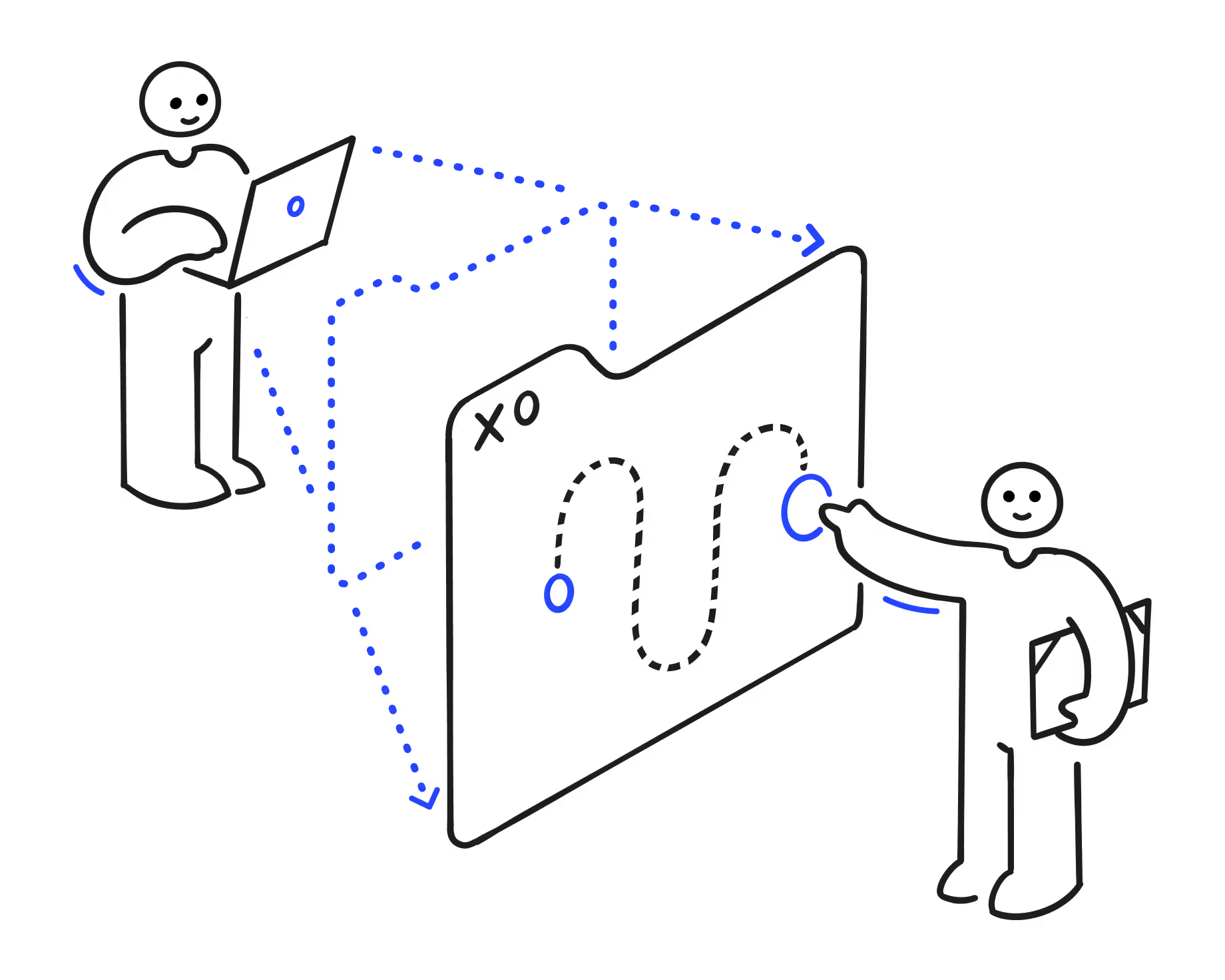Navigating friendships at work and being your friends’ manager

Discover Workleap Officevibe's benchmark report on 12 key employee engagement metrics

When you have a bad day, when good things happen, or when you are stressed…having friends at work is key to job satisfaction, managing stress, and staying connected to your work.
But when you are the leader of a team, managing friendships at work can feel tricky. Especially when those friendships involve people you manage.
We spoke with real managers who have gone through this experience. They shared some tips on how to go into your friendships with confidence, and without losing your ability to fully develop as a leader at the same time.
Since some of these people still work with their current friends and managers, they asked to remain anonymous.
Why work friends are so important and needed
Being a manager might isolate you from your team
You might think that as soon as you become a manager, that means that you will lose the ability to befriend your team. On countless occasions, we have heard managers say,
Being a manager can feel lonely.
However, letting loneliness grow deep can have consequences in your development as a professional and your ability to overcome challenges. If you feel like there’s no one you can bounce ideas, connect, or share experiences with, you can develop a sense of isolation and disconnect from your workplace and team.
In an observational study by Sigal Barsade and Hakan Ozcelik to understand how loneliness affects work performance, they found that indeed loneliness led to withdrawal from work, weaker productivity, motivation, and performance.
How work friendships help as emotional support
There will be times when you’ll have to manage difficult employees. Or you might be trying to mitigate a complex conflict between team members. These instances are unique to you as a manager, and often charged with emotions. And although you need to learn how to manage and express emotions at work, these moments will happen and emotions are human.
Having a friend you can be your true self and express your feelings with is key to your wellbeing, stress management of your role, and overall happiness at work.
We know that having friends at your workplace is necessary, but it’s not always that easy when you are in a leadership role. Here are some tips to help you find friends in the workplace.
From lonely to friendly: finding friends at work
1. Develop a strong connection with your team
Even if you feel like being friends with your team is tricky because of your role as their manager, you can still develop strong relationships with them (and to a degree, even friendships).
In relationships, nothing is black or white. There are many scales of grey.
And although maybe you won’t be able to rely on one of your team members to discuss a team conflict or an issue with your boss, they can still have your back and connect with you.
If you want to start somewhere, start by establishing trust. From experience, this can be a game changer in how in-depth you get to connect with your team.
2. Connect with other managers within your organization
One of the best pieces of career advice we can give (around this topic) is to find other managers in your organization. Although it can be intimidating to reach out to people outside of your team ― even more in the remote work context where it might involve people you have never met before, a fellow manager will understand a lot of what you go through.
They'll understand things like managing up (being the middle person between your team and leaders above you), finding the right balance between managing your team and getting your own work done, working out challenges on your team, and many more instances make your job as a manager as rewarding and as challenging as it can get. These common grounds can help you initiate conversations and develop friendships.
3. Increase your network
When it’s difficult to find friends at work because your managerial role involves a lot of confidential information, or you have a big influence in the day-to-day lives of people, finding friends at work and within your organization can be more challenging.
That’s where growing a network around you that gets you is important. You can start by building your personal brand online as a manager or looking for advice online, and slowly starting conversations. You can also join online groups of managers within your industry.
The opportunities and options are endless, and you can find real friendships. Even outside your own workplace.
Awkward or not awkward: managing friends at work
Many companies choose to promote from within. It’s cheaper, more time-efficient since there is less training involved, and it’s a great way to recognize people’s potential.
This is how many people embark on their new job as managers. They might find themselves in the position where they just got promoted, and now it’s their job to manage a team, and potentially their own friends.
Here's what some managers who have been through it had to say:
It will be awkward at first, but not forever
"It did change the dynamic a bit."
“It did change the dynamic a bit. Had to work through the awkwardness of it at first. Some topics are no longer discussed. But we just respect each other and moved on. We're still close friends to this day.”
The key thing to expect here is a change in dynamic. Change always comes with an adjustment period. Expect this period, as it happens to everyone, knowing that with time, it will pass.
Early and continuous communication are key
"When I was promoted, I was afraid to tell my close friend at work."
“When I was promoted, I was afraid to tell my close friend at work. Mainly because we used to be coworkers and do the same job. When I heard the news, I felt like I couldn’t tell her. I didn’t want to ruin things. The problem came when our VP announced the news. He had to disclose that the conversation was months in the making and that I had agreed to accept the opportunity. That only made things more awkward for us. After talking it through, what bothered my friend the most is knowing that I didn’t feel comfortable telling her. She would’ve loved to hear it from me and be happy for me!”
This is a hard call. Especially if the information is confidential and it isn’t up to you to disclose your upcoming promotion. However, from our conversations with managers, there was a common tool: communication. If you are able to, talk to your friend as soon as possible. Most likely they will be happy for you!
“I knew the vision I had for my new team and the type of manager I wanted to be. I shared my plan — out of excitement more than anything — with my friend. She wasn’t surprised at all about my ambition! She knew me very well and saw that coming. But as I transitioned to my role and adjusted things in the team, it helped her anticipate my expectations, even if they involved me setting new goals for her.”
Keeping communication constant and understanding that it will take some time before you find the right ways to work together, can really help you and your friend transition to your new dynamic. Your friend will know what to expect from you as their manager, and that will help them to process the changes to come.
Empathy goes a long way
This will apply to both sides of the friendship. On your side, take a few minutes to consider how you would feel if your friend became your manager. And your friend will have to think about how it would feel for them to be moved to manager.
Even if your friend takes some time to adjust, empathy will be the best way to understand their behaviours. From our conversations with managers, we saw that empathy was often their starting point when finding a balance between friendships, work, and leadership.
"We both wanted the promotion."
“We both wanted the promotion. In fact, we used to work so well together because we were as motivated to push for the same goals! So when I became manager, I had to give some room to my friend to be upset and disappointed. I would’ve probably felt the same way if I'm being honest…I thought about what I would want my friend to do if the situation were reversed, and that empathy really helped us pass over the tension.”
Transparency and clear processes make things fair
“My biggest fear was that my team would think I was going to favour my two best friends in the team. I right away decided I was going to have methods in place for recognition and when assigning projects. Having impartial systems that benefited those who had the skills, seniority, and time to do certain projects made it clear to my team that it wasn’t up to me. It was up to them. No favouritism there!”
For recognition, opportunities, benefits, and ideation…having a plan and open process will help your team know that you won’t favour everyone specifically.;
{highlight}Pro tip: make sure the metrics you use are factual and not ambiguous. For example, saying that you value dedication on your team might be too open to interpretation. Be more specific by saying that you value collaborating with outside teams, bringing up new ideas, meeting goals, etc. The goal is to create a work environment that feels and acts fairly.{highlight}
Talk about it and have the uncomfortable conversation
“Listen, we all knew there was an elephant in the room. I had very good friends in the team before I became manager. And what was worse, the next promotion was going to be, in part, my decision! I knew that even if conversations could be tense, I needed to talk to people about this. I was open about it, gathered my team’s concerns, and was upfront with my friends about how the decision was going to be made. It took courage, but I think my team respected it and my friends appreciated it.”
It can be stressful, but having those difficult conversations will set you up for long-term success. Allow yourself to be a little uncomfortable, be proactive at bringing the conversation topic yourself, and keep a record of what you discussed to avoid misunderstandings down the line.
{highlight}Pro tip: Managers love our one-on-one meeting software because it allows you to set collaborative agendas and book meetings with all team members, and keep a record of the conversation points! Transparency and equality will be your allies in keeping trust strong on your team. Sign-up free for Officevibe and lead with confidence, even in the most awkward conversations.{highlight}
In the end, I was able to maintain all of my friendships after my promotion, and even had to give some disciplinary warnings.
"But I think the fact that I treated all of my team with the same respect and transparency that I would want from a manager was really the biggest help."
Too busy? Save the key points only
You can save the image below (drag to your desktop or right-click and save) with the main and most actionable points from this article, and/or send them to your email.

It will take some time, empathy, and openness, but you can reach a healthy balance in your friendships at work. Learn when to confidently lean on friendships and when to lean on your role as a manager and leader. The stress and tension you feel is a sign that you care. Be kind to yourself, have empathy, and continue developing strong relationships.
FAQs on cultivating more honest relationships with friends you manage
How can I maintain fairness in the work environment when managing work friends? When managing work friends, it's vital to ensure that you treat all team members equally to avoid perceptions of favoritism. This means applying policies, rules, and decision-making processes consistently across the team.
How do I balance professionalism and workplace friendships? It can be challenging! Developing friendships at work doesn't mean forgetting about professional boundaries during work hours and activities. It's important to maintain professional behavior in the work environment, even with friends.
How do I manage conflicts effectively when they involve work friends? Conflicts can occur in any work environment and they can be more challenging to navigate when they involve work friends. The key is to handle them promptly and impartially, focusing on the issue at hand and not just your friends' personal feelings.
How can I set boundaries between my personal and professional life when managing work friends? Establishing boundaries in workplace friendships is crucial to maintaining a healthy work environment. Make sure to communicate openly about when and how work-related matters can be discussed outside of work. For example, you might establish a rule about not spending your entire lunch break talking about work-related issues.
How can I have career progression discussions with friends I manage at work? Career progression discussions with work friends should be handled in the same professional and objective manner as with all other team members. Developing more honest relationships where constructive feedback can be given and received will help support their professional development.
How can I mitigate emotional bias when making managerial decisions about work friends? Emotional bias is a common challenge when managing friends in the workplace. Focusing on objective criteria, getting opinions from other team members, and reflecting on decisions before finalizing them can help. It's part of creating a fair and balanced workplace culture where friendships and professionalism coexist.
Give HR and managers the clarity, confidence, and connection to lead better every day.












